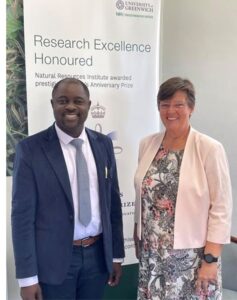Joint Research Partnership Scheme launched by the Natural Resources Institute (NRI), University of Greenwich UK and the Centre for Food Technology and Research (CEFTER), Benue State University Nigeria.

Barnabas Ikyo – Director, CEFTER and Sheryl Hendriks- Director, NRI
Following successful teaching collaboration over the last five years, the Natural Resources Institute (NRI), University of Greenwich and the Centre for Food Technology and Research (CEFTER) Benue State University have agreed to expand their collaboration in research. The new research partnership scheme will operate through an internal competition with funds contributed by both partners. The funds will be used to support innovative research directions, generate data and produce outputs that lead to expanded future collaborative research opportunities.
NRI and CEFTER will each contribute £50,000 for the academic year 2023/2024 to grow research excellence and future research revenues through their partnership. The aim is to fund a minimum of five projects. NRI’s funding for this joint research scheme is drawn from its Food and Nutrition Security Initiative (FaNSI) Programme, while funds from CEFTER are drawn from the World Bank funded Africa Centre of Excellence project. The funding from each partner will be used to cover their own associated staff time and research costs, e.g. travel.
For NRI, this initiative aligns with Greenwich University’s Research and Knowledge Exchange Sub- strategy whose priorities include: conducting world leading, rigorous, impactful/creative research through sector leading knowledge exchange addressing local, national and international challenges and teaching and learning informed by research, practice and knowledge exchange.
For CEFTER-BSU, funding aligns with the core objectives of the Africa Centers of Excellence for Development Impact project, which include: carrying out world leading, rigorous, impactful/creative research, sector based knowledge exchange addressing local, regional and international challenges, production of quality research that will lead to control of postharvest losses, and production of high quality joint publications from student based academic research in partnerships with regional and international academics.
The research scheme will support applications that show potential for success in the following research areas: termite control, innovations in low cost postharvest technologies for smallholder farmers and food processors, nutritional profiling of indigenous foods recommended for diabetic patients, packaging and transportation of tropical fruits and national food supply forecasting, including import and export deficits for rice and cassava and quantification of citrus and cassava produce in Benue State, Nigeria.
